#ira: so what did garak wanted from bashir
Photo

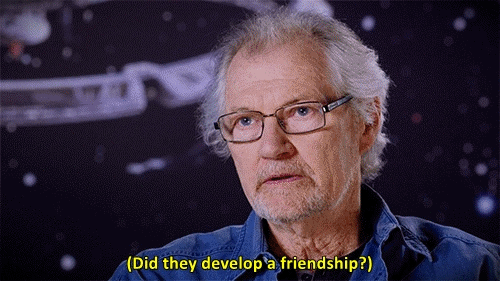
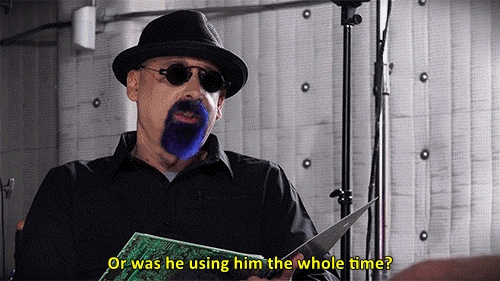
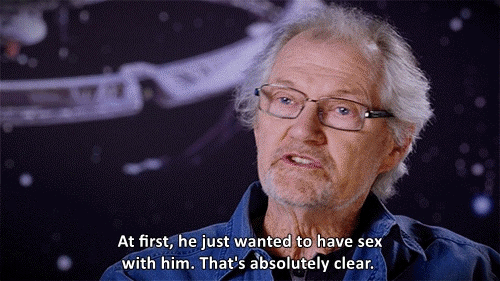
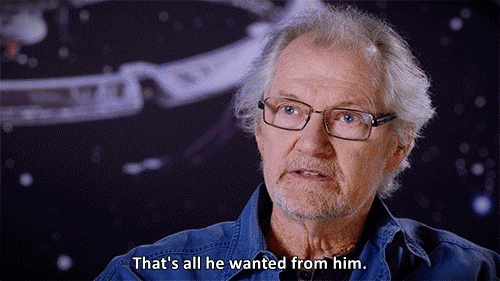

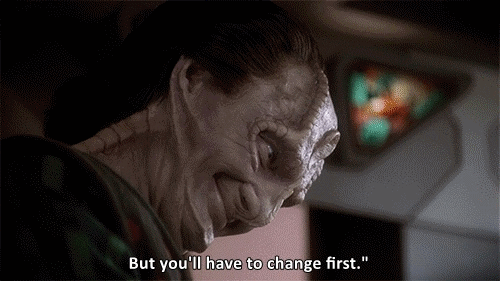
But then it really got complicated, especially when Garak's addiction and despair began to surface. He needed someone to share it with.
Ira Steven Behr and Andrew Robinson in the DS9 documentary What We Left Behind
#What We Left Behind#garashir#trekedit#ds9edit#DS9#startrekedit#Andrew Robinson#Ira Steven Behr#ira: so what did garak wanted from bashir#andy: he wanted to f*ck him#Garak Bashir#my gifs#my DS9 posts#Star Trek#Deep Space Nine#Star Trek: DS9#st: ds9#star trek deep space nine#star trek: deep space nine#Garak#Bashir#Julian Bashir#Elim Garak#Dr. Bashir#honestly the serious way that andy says this... i love this man
10K notes
·
View notes
Text
ok no one cares but i am once again thinking about how andrew j. robinson’s writing in a stitch in time fundamentally changed the the way i’ve come to view garak and how i interpret the “Of all the stories you told me, which ones were true and which ones weren't?” / "My dear Doctor, they're all true." / "Even the lies?" / "Especially the lies.” interaction from the wire (which initially i was very thrown off by). by suggesting that the stories garak fabricates are indicative of how he chooses to define himself, i think the stories from the wire serve specifically to illustrate what garak most covets/coveted in life, and that they contain elements of the circumstances/relationships/motivations/etc. that garak never had, or were beyond his reach. by making up these particular circumstances, garak is juxtaposing his words against the actuality of his life, and by that comparison his lies demonstrate the truth of his relationship with tain, his work in the obsidian order, and his personal convictions...
Story 1: “During the occupation, I was a Gul in the Cardassian Mechanised Infantry. We were stationed just outside the Bajoran Capital. Shortly before the withdrawal, a handful of Bajoran prisoners escaped from my custody. My aide, a man named Elim, tracked them to a Cardassian shuttle about to depart for Terok Nor. Elim got aboard, but the captain refused to let him search the ship, because he claimed he was under strict orders from Gul Dukat to depart immediately. So I had the shuttle destroyed, killing the escapees, Elim, and ninety seven Cardassian civilians... I followed my orders. None of those prisoners escaped off of Bajor alive. Unfortunately as it turned out, one of the passengers on the shuttle was the daughter of a prominent military official. I was stripped of my rank and commission, and exiled from Cardassia.”
-> what i get from this one is that garak wants a) companionship (in this “aide”, elim), b) authority (in my mind, this is more of a past item of desire. in his youth in the obsidian order, he wanted to emulate tain, and was indoctrinated to think that power should be sought after above all else, and not relinquished), and c) ruthlessness. the crowning jewel of tain’s service as the head of the obsidian order, garak grew up with detachment and brutality being demonstrated as the guiding principle of leadership, command, delegation...
the funny thing about all these garak episodes, and which I am glad to see that the fandom so readily picked up on (see one of my favorite posts: “i don’t understand why ds9 fandom casts garak as some sort of suave oscar wilde daddy dom when he’s clearly the kind of older man who gets trashed at a casino at 3pm on thursdays and tips dabo boys extra to hold him while he cries”) is that for all his posturing, for all his discussion about the difference between cardassian principles and “federation dogma”, for all we actually, genuinely learn about what garak did during his time in the obsidian order (for all interested in garak’s life pre-terok nor/ds9, please take this free link and read a stitch in time it’s one of like... two trek novels i’d ever recommend and is so good i promise <3), for all we learn about what he did after (the assassination of senator vreenak “in in the pale moonlight”), garak still doesn’t... come off as hardened, or unfeeling. he repeatedly demonstrates a willingness to put himself in harm's way to save the people he cares about (most notably, bashir/martok during their time in the jem hadar prison, but even once going to cardassia to save kira, who detests/detested him (depending on if you believe their relationship changed over the course of the show) and risking arrest/execution by returning to cardassia during his exile). for all his pretending otherwise (from second skin: GARAK: “I have no intention of sacrificing my life to save yours. If it looks like we're in danger of being captured... if there are any signs of trouble at all... you're on your own. SISKO: Mister Garak, I believe that's the first completely honest thing you've ever said to me.”), Garak isn’t selfish, or at the least isn’t constantly, predictably selfish. He’s self-sacrificial more often that he’s given credit for, he’s occasionally kind. I think the first story he tells in the wire is so indicative of the inner conflict he feels. inside him is a child who was brought up to revel in the glory of violence in the middle of a military occupation of another world. there is a part of him that persists in believing strength is only fortification, obfuscation, invulnerability. and yet there is a part of him now wrestling with the belief that he can only be saved through honesty, by telling bashir about the implant and why it’s there and who he is that warrants it. one of the most remarkable things about this wholly incredible episode is this struggle between these two parts of himself.
and really, garak isn’t stubborn, or stupid. he knows if he wants to save his life (and for a moment... for some inexplicable reason, he does), he’ll have to give bashir some tipping hint. he has to tell him enough of the truth to give him a way to help him, and that’s what all these stories come down to. he is hinting as best he can. he is explaining as much as possible, so as not to betray the angry little boy inside him who sees this addiction as a weakness, who sees his attachment to bashir, and to his life on the station as a vulnerability, exploited.
then there’s a second layer in which (after discovery that garak is elim) the audience gleans that garak (in his youth) desperately wanted direction, for someone to tell him what do to and how to do it--that he wanted to be excused from his actions on the basis of “following direct orders”... god, but then I think about how garak chooses to kill the figure of elim he paints here. paired with the resignation to his own fate at this point in the episode (garak knows a replacement device can’t be obtained, that his body is too reliant on the implant to function on its own, and that withdrawal without supplement will be deadly... which is to say garak is sure he is going to die), this seems so poignant. does he wish he’d have died years ago? killed in some random shoot out at the orders of someone higher up on the obsidian order’s chain of command? and can you imagine that? tain would bury the report so as to conceal his son’s involvement with the order (sentimentality always coming second to security, of course), letting this “elim garak” be listed as some citizen at the wrong place at the wrong time, a random victim of the violence of the bajoran occupation... garak, in an instant, would be forgotten. brushed aside by his father in favor of obscuring the actual operation undergone.
in the end i think the most i get from this version of the story is that subtle death wish. if he had been a less important operative, or if he had died then, he wouldn’t be enduring this now (return to the conversation about a lifetime serving cardassia re: “the neverending sacrifice” at the opening of the ep....). part of me believes garak wishes he would have died then, before he could have been exiled, before setting up his shop on the station, before meeting bashir...
garashir side note: “At first, he just wanted to have sex with him. That's absolutely clear. That's all he wanted from him. ‘Come to my shop, I got some nice clothes for you... but you'll have to change first.’ But then it really got complicated, especially when Garak's addiction and despair began to surface. He needed someone to share it with.” - Andy Robinson, from “What We Left Behind”. / “What we should've done, after The Wire in season two, the episode where Bashir helps him get over his addiction, we should've had Garak come out to Bashir as a gay Cardassian... Garak comes out as gay in season two, we have five seasons to play that Bashir and Garak relationship. Where that would have gone, who the hell knows, but it could've been so cool.” - Ira Steven Behr, from “What We Left Behind”.
Considering these two quotes from the actor who played Garak and the head writer on DS9, another thing about this episode I’m throwing my two cents in for is the obvious implications for this deepening the relationship between garak and bashir. One of the most frustrating things about this episode is how much it just begs for more, more, more. The casual banter about literature they start up at the beginning of the episode, the refusal on garak’s part of letting bashir take him the the infirmary (hello cardassian stubbornness, the whole scene reeks so much of ‘I do not want you to see me vulnerable, I want you to think me strong and independent and not in danger’. the whole charade reminds me so much of a wounded animal putting on a brave face so as to not be found out. garak does not want bashir (specifically!) to see him sick, to see him needing. he does not want to admit that he needs his help, that he needs him)...
then everything else that follows that, bashir worriedly reaching out to his friends for help and advice: talking to o’brien about his concerns for garak and asking about retrieving the cardassian medical files, then to dax, who tells him flatly “It sounds like you're taking this personally.... It's not like you two are really friends.”. the affront on bashir’s part at hearing that. “It's just that Garak and I have been having lunch together once a week for more than a year now. You'd think he'd come to trust me a little!” he exclaims. then how defeated and angry he is (violently stabbing her plant with mycorrhizae), the strong thread of bitterness humming in his honey-sweet voice, “If he doesn't want my help, that's his prerogative.”
there’s something so magnificent about the timeline here. how long they’ve known each other by now, the fact that bashir is the only person garak really considers his own on the station (“it isn’t bashir who dies, is it? Ira, you’re not going to kill off julian, are you? I mean, where does that leave me? I mean, he’s my only relationship in this show! I don’t have him, I have nothing. I’m hanging out in space with nobody to talk to!” - DS9Doc's Ira Steven Behr pushes for more DS9 in HD!)... it’s so plainly laid out that bashir is the only thing garak has, the only reason he has to be curious about what else life could bring him at this point in his life, so far from home, from his family, from the only job he ever felt he had been suited for.
which is not even to mention julian’s reaction to this first story. “So now you know, Doctor. I hope I haven't shattered too many of your illusions.” garak concludes. There is a pregnant pause of still hesitation (in which i imagine garak is reeling--because, at the same time, i think, despite this relay being an attempt to communicate his own misery, these stories are also made to push something in bashir. Garak is at the end of his rope, drifting (almost) untethered into unknown space and he is reaching out in the hope that julian, (despite, despite, despite...) will take his hand. Garak is trying to see just how far Julian will go to save him, to forgive him. He is trying to discover if there is an exception to his “federation dogma”, if there is really truth to that myth of human kindness he’d heard so much about...
in this moment, Garak is playing this horrific, dangerous, loving, desperate game of cat and mouse. “Could you still love me if I...” he seems to say, and believes at some point he’ll be responded to with a “no”, but hopes, against his better judgement, beyond belief, that he wont be.
And then Julian looks up at him, faces close enough for Garak to feel his steady breath on his cheeks as he says, calmly, “Listen to me, Garak. Right now I'm not concerned with what you did in the past. I'm simply not going to walk out of here and let you die. We need to turn that implant off and whatever withdrawal symptoms or side effects you may experience, I promise I'll help you through them. I need to know where that triggering device is. Where is it?”
And that line is it for me, beyond so much of the other golden ones in this episode. This is the first time that Garak hears that unequivocal acceptance, and it just sends him staggering. In all his life, he’s never been faced with love like that. His father pushed him away, let him believe for years that he wasn’t his son. Mila didn’t, or couldn’t, or wouldn’t put up a fight for him when Tain exiled him...
this is one moment in ds9 where i am particularly grateful for ds9 being filmed on a 4:3 aspect ratio that forced characters so close together to be in a shot. in this scene, a line from Shauna Barbosa’s “GPS”, Cape Verdean Blues comes back to me, and I look at the pair of them so close on the screen, Julian so open and Garak so agast, and I just think, “You kiss the back of my legs and I want to cry. Only / the sun has come this close, only the sun.”
all is to say: andy robinson himself has said that bashir is the only relationship garak has. assuming garak’s killing of elim in this first story is indicative of his own wish that he might have died during his work with the obsidian order (and thus been spared exile, the torture of life on the station, the gradual dependency he forged on the implant, and the inevitable withdrawal he was going to experience), there necessitates a question of why garak should agree to treatment (thus saving his life) only to continue living on a station he found so hellish in the past*
*oh... the magnificent (perfectly summative) conversation between Tain and Bashir... “BASHIR: He's dying. TAIN: And you're trying to save him. BASHIR: That's right. TAIN: Strange. I thought you were his friend. BASHIR: I suppose I am. TAIN: Then you should let him die. After all, for Garak, a life in exile is no life at all.”
to me, this question has three answers: 1. he is appeasing an insistent julian (though this begets the suggestion that garak doesn’t have much faith in julian’s treating him--in which case, garak decides that one of his last acts in life will be making julian happy) 2. he is choosing to live because he is... intrigued by julian. because he likes his company and the meals they share and the books they trade... and because he is curious to see where this relationship will go. Julian has made his life bearable (dare I say enjoyable? see: “GARAK: [They] left me to live out my days with nothing to look forward to but having lunch with you. BASHIR: I'm sorry you feel that way. I thought you enjoyed my company. GARAK: I did. And that's the worst part. I can't believe that I actually enjoyed eating mediocre food and staring into at your smug, sanctimonious face. ”) and has thus given him some reason to get up in the morning, even if it is for a frivolous little lunch appointment in another few days or 3. he is choosing to live not for julian, but directly because of him. even if this relationship has a platonic reading, it can’t be denied that julian opened up a new world for garak, and if nothing else was able to stay his boredom/disgust with life on the station
Story 2: GARAK: There was a time, Doctor, oh there was a time when I was a power. The protégé of Enabran Tain himself. Do you have any idea what that means?... Tain was the Obsidian Order. Not even the Central Command dared challenge him. And I was his right hand. My future was limitless until I threw it away. BASHIR: You mean when you had that shuttle shot down to stop those prisoners from escaping? GARAK: Stop them? I only wish that I had stopped them. BASHIR: You didn't? GARAK: No, Doctor, my disgrace was worse than that. Unimaginably worse. BASHIR: What could you have possibly done worse than that? GARAK: I let them go. It was the eve of the Cardassian withdrawal. Elim and I were interrogating five Bajorans. They were children, Doctor. None of them were older than fourteen years old. They knew nothing. They lived in bombed-out rooms, scrounged for food on the streets. They were filthy and they stank. The room was freezing cold, the air was like ice, and suddenly the whole exercise seemed utterly meaningless. All I wanted was a hot bath and a good meal. So I let them go. I gave them whatever latinum I had in my pockets, and opened the door, and flung them back into the street. Elim couldn't believe his eyes. He looked at me as if I were insane.”
-> from this version of the story there’s a much clearer division between the elim garak (a young agent of the obsidian order baptized in fire) he was in his youth and the elim garak he is now (a disgraced former agent, exiled, alone save for one ambitious, self assured federation doctor). this, i think, seems to show the separation between what this character “elim” (young garak) wanted: which was uncompromising brutality and dedication to his work, and what present garak wants: peace, a full belly, the ability to be charitable (specifically to young, hungry bajorans)...
this story to me is one that best places this contemporary incarnation of garak relative to his bajoran counterparts on the station. in the beginning of this episode, when telling bashir why he initially chose to activate the implant, he speaks about how he, as the only cardassian living on ds9, is viewed by the bajorans living there. (“Living on this station is torture for me, Doctor. The temperature is always too cold, the lights always too bright. Every Bajoran on the station looks at me with loathing and contempt.”) In this story, by releasing the children and giving them the latinum he had, he’s trying to repent to Julian, asking to be forgiven for the part he played in the occupation of bajor by showing that he was/is (depending on how you view the timeline of the progression of his attitudes) sympathetic to them, and that he regrets the hand he had in bringing war, famine, and subjugation to them.
Story 3: “GARAK: Elim wasn't my aide. He was my friend. We grew up together. We were closer than brothers. For some reason, Enabran Tain took a liking to us. Before long, we were both powerful men in the Obsidian Order. They called us the Sons of Tain. Even the Guls feared us. And then there was a scandal. Someone in the Order was accused of letting some Bajoran prisoners escape. There were constant rumours of who was going to be implicated. Fingers were being pointed at me. By then Tain had retired to the Arawath Colony. He couldn't protect me, so I panicked. I did everything in my power to make sure that Elim was accused instead of me. I altered records, planted evidence, only to discover that he'd beaten me to it. BASHIR: He betrayed you first? GARAK: Elim destroyed me. Before I knew what was going on, I was sentenced to exile. And the irony is, I deserved it. Oh, not for the reasons they claimed, but because of what I had tried to do to Elim, my best friend.”
-> whenever I think back to this, my first impression remains that this is one of the stories where Bashir is considered. At this point, Garak’s been transferred from his room to the infirmary. Despite turning the implant off, toxins are continuing to accumulate in his lymphatic systems. He’s been sad (even woke bashir up with his weeping), he’s been angry (destroyed the vase and flipped the desk in his room, attacked bashir...), and now he’s calm, and tired. He thinks this is the end. He refuses to have the implant turned back on, which nurse jabara estimates might give him another week to live. This is the end of the line for him, and he’s accepting it with dignity and grace. He goes to release Bashir from his obligation to him “you’re done enough, Doctor. More than I deserve...” and goes to tell Bashir “the truth”. To me, this is his goodbye. Even if it isn’t a true story, this is the gift he’s giving Bashir. This is what he (spinner of wonderful lies, obfuscating agent of the despicable obsidian order) can give him as a parting gift--it is what he wants him to have.
in this story, Garak is not friendless, as he is on the station. He has a close relationship with someone (’see, then, doctor?’ he seems to ask playfully, life sputtering out of his eyes. ‘i am capable of it!’)... and yet, there is also betrayal. It reminds me of an assurance, in a way. “Bashir,” he seems to say, the entire weight of all the good doctor’s efforts to save him pressing down on his every word, “look what might have come to you had I allowed you to care for me. There is only danger for you to find in me.” In this, Elim stands in place of Bashir. A steadfast friend who Garak works against for the sake of self preservation. In this moment, Garak is pleading with the man standing above him next to the biobed. He is insisting Bashir be grateful for the shallowness of their relationship (something I Garak ensured deliberately), and telling him that, though he is grateful for him, that if they had been closer, Garak would only have caused him pain.
The heart of this story is Garak’s appraisal of his own self worth. Regardless of how much he’s changed since his time in the order, he persists in thinking he functions in the world to cause harm, much so that it is the only thing he’s able to do. Garak sees himself as the knife in the backs of others, or the hand raised, dagger in clutch.
the second thing i see is contained wholly within the line: “By then Tain had retired to the Arawath Colony. He couldn't protect me, so I panicked.” aside from assurances made to bashir, i think the purpose of this speech is to demonstrate (in the fashion of the lies being true) that garak wanted, and still wants safety. he wanted someone (Tain) to come to his defense then. while this extends to the implication that garak wanted tain, as his father, to stand up for him out of pride, or love, or even a perfunctory sense of parental commitment rather than exile him (a recurring desire illustrates/suggested in the show/books), i also think its perfectly suited to the care julian is exhibiting in tending to him in this episode. for all garak’s refusal to acknowledge his pain (a mere headache, as he claimed when they stood outside the replimat), for all his refusal to go to the infirmary when they meet at quark’s later, the care julian is constantly exhibiting through this episode is what garak is most endeared by. it is the thing he wanted most in his youth, and the thing now (because it was denied to him then) he finds so difficult to accept. there are many (many) instances throughout the show of garak and bashir talking about the extension of federation help/kindness, and this being something bashir embodies, btu this is one of the illustrations that sticks with me because of its particular placement. In the story, Garak wanted protection. He was alone, and afraid, and wanted help. As it now stands, he is not alone, he is calm, and has help. That is perhaps the most startling revelation for him of all.
and last but not least another... intriguing part of all garak’s stories is his repeated separation of himself and elim. the illusion of separation is one of the most intriguing (and heartbreaking) aspects of these story to me. garak has always struck me as the kind of character who sees grief and regret as an impetus for amputation. he believes what is unpleasant or unnecessary about him he can cut off and live through. he believes he can build up a wall between himself and what he doesn’t want to see or experience without repercussion (this being why he activated the implant in the first place). by making elim and himself two separate people he is not only distancing himself from whatever it was he really did, thus taking responsibility for it in part and allowing the other half of himself turn away in disgust and without sympathy, but suggesting that he cannot be culpable entirely for what it was he did.
in each of his stories, the blame is to be shared, divided. the hardest part of all of this to swallow is that even after all this time, he’s begging for someone to spare him of the crushing loneliness of disgrace, begging for someone to understand fully what he’s done, accept him, and shoulder a part of his burden, much so that he creates an entirely new incarnation of himself just to sit with him in hell.
anyway ive also been fucking around on memory alpha and this was intriguing to me so im putting it here:
"When I was writing the story," stated Robert Hewitt Wolfe, "the movie Schindler's List had just come out and Ira was saying, 'Maybe he was Schindler; maybe he was the guy who let the prisoners go.' And then it was, 'Maybe he wasn't; maybe he was the Butcher of Budapest.' So we just kept telling all these lies, and I think the truth lies somewhere in there. Maybe he did let people go. Maybe he did shoot down the ship. Who knows?" (Star Trek: Deep Space Nine Companion (p. 141))
#trek#elim garak#sorry for longposting but once again i am thinking about him (garak)#he's just such a fantastic character that i read SO MUCH into#its a shame they didnt do more w him really im upset he wasnt as cherished by fans when the show was in production as he obviously is now#also. reminds me why i have this url#he's deeply fascinating and i love him and hate him and sympathize with him and think hes unforgivable and i ....#ANYWAY i am not even going to talk about the . hand holding 'i forgive you... for whatever it is you did' thing because that opens a BREACH#this is one of the longest posts ive ever written on this god awful site#anyway it is from the heart#i love him so much and i love this episode.
121 notes
·
View notes
Text
my takeaways from what we left behind
1. the actors really understood their characters in ways that I don’t know if the writers always did. with the exception I feel of Siddig and Meaney who didn’t get to talk about their characters in depth (all Siddig really got was to say a bit about how people disliked his character to begin with + the stuff about Ezri I don’t agree with and I’d have loooved to have heard a bit about O’Brien from Meaney’s pov, his moving through his trauma, etc through his friendship with Bashir but oh weeell).
2. this became even more obvious to me when I saw the outline for the hypothetical episode the writers did. it feels like it came less from a place of character and more “what would be most surprising,” which isn’t how I write at allllll. that being said it was an outline for a first episode, so things could always reveal themselves differently in a hypothetical season
3. Andy Robinson. that’s it
4. Nana Visitor. also that’s it.
5. no hold on, on Andy, I want to personally thank him for having every one of his lines be iconic, and for constantly mentioning Julian, what a legend (also he seems like he’d be up for comin back, just saying. all that enthusiasm...)
6. Nana Visitor clearly haaaaated the “gul dukat and Kira’s mother” plotline and I feel vindicated on this also, because it felt cheap, badly written to the point of offensiveness (women forced to have sex with their oppressors being to blame is not a take I expected to see on this show)
7. I thought Nana mentioning that it would have been ineresting to see Kira start a relationship with a Cardassian (just not gul dukat), because uh yeah, hard same, esp post-dominion war. my first gut instinct was how she and damar really had a great dynamic but a. he died and b. i want kira to be with a woman, so now I have headcanons about her and Garak continuing their friendship (begun then imo) and her helping out, cos she becomes idk, main diplomat between bajor and cardassia and she through him and her work she meets this great cardassian gal...
8. everything Avery Brooks. especially Brooks basically adopting Lofton. fuck. i’m glad they were so honest about his contributions to the show, as actor, director, bringing in his culture and with that the casting of more black actors and creatives. (fully can feel the racism is still palpable in particularly that studio head guy who said that the look of beard and bald was “street” like dude... c’mon).
Also he directed the episode with Lenara and Jadzia. A true icon.
9. Rene Auberjonois talked about his obituary. Aron Eisenberg cried about how much this show meant to him. RIP to you both, the show wouldn’t have been as fantastic without all you gave to it.
10. Ira acknowledged they didn’t do enough for the lgbt+ community, although I don’t think he went far enough in that acknowledgement (he didn’t actually say “lgbt+ or queer” he just said sexual identity), probably because he doesn’t know much about the community really? which to my mind feels like, as well-meaning as he is, what’s needed is definitely a new guard of writers if he’s indicative of the more liberal of tv right now
11. the ending was perfect. i was fully prepared and half-way to tears and then that fucking quartet??? this cast is really perfect (and I haven’t even MENTIONED armin shimerman inviting the ferengi-crew to his place or how funny he was) and I’m so glad they still have so much love for each other and their work
#what we left behind#ds9#st: ds9#star trek#avery brooks#nana visitor#andy robinson#rene auberjonois#armin shimerman#aron eisenberg#alexander siddig#nyaaa didn't even get into the part with terry where she talked a bit about leaving#clearly it was such a shit time for her but I'm glad she and the cast still get on#colm meaney
83 notes
·
View notes
Text
So the story goes like this: I’m in London for the month, popping into every used bookstore I find, and while in one I spot Captains' Logs Supplemental: The Unauthorized Guide to the New Trek Voyages. Though baggage weight limits won’t let me buy it (I have already bought so many books) I did snap pics of the “Past Prologue,” “Cardassians,” and “The Wire” entires. And then transcribed them. Because I thought the other Garak stans might enjoy this info!
Worth the read imo 💜
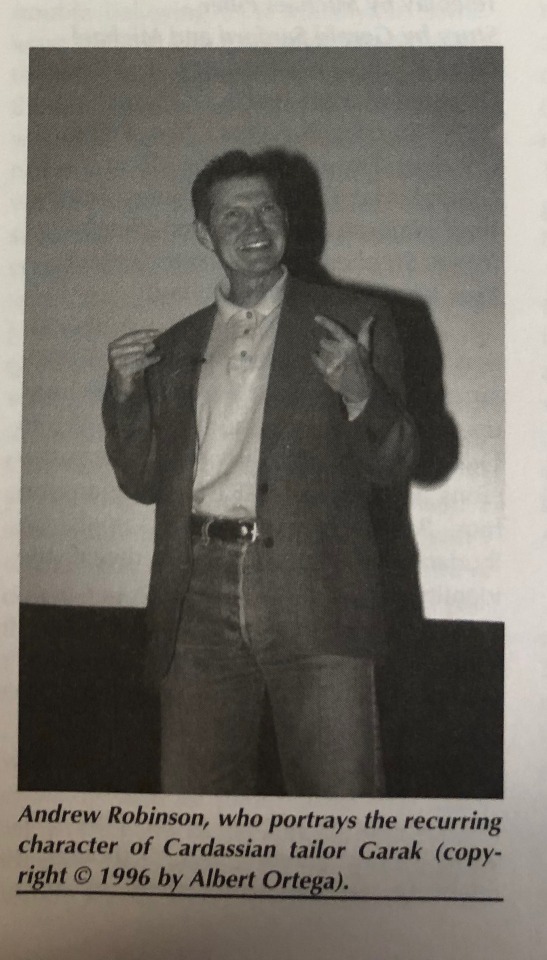
Episode #3
“Past Prologue”
Original Airdate: 1/11/93
Written by Katharyn Powers
Directed by Winrich Kolbe
Guest Starring: Jeffrey Nordling (Tahna), Andrew Robinson (Garak), Barbara March (Lursa), Vaughn Armstrong (Gul Dunar), Richard Ryder (Bajoran Deputy), Susan Bay (Admiral), Gwynyth Walsh (B’Etor)
“We didn’t want your typical Cardassian in there,” says director Winrich Kolbe of the creation of one of DS9’s break-out characters, the Cardassian spy Garak. “Obviously it would have been hard to put a real Cardassian soldier in a clothing store. Perhaps it would have been terrific, who knows, but what we felt we had to deal with was somebody abnormal—at least as far as the Cardassians were concerned. It was one of those things where I wasn’t quite sure whether Andy Robinson would be the right guy. I had a different idea as to what type of actor I wanted, but Andy Robinson was available and turned out to be terrific. What I wanted, which shows how far off I was, was Sydney Greenstreet. I have to admire an actor who has to come in at three in the morning and stay in that kind of makeup for the rest of the day and still be able to give a performance.”
Comments Michael Piller, “One of the things about ‘Past Prologue’ that bothered me was that Bashir’s performance was in a very broad range—and this was newness. I believe we have strange aliens, strange makeup, spaceships, explosions and wormholes and costumes that are crazy, so that the people within them have to be entirely credible. If those people get too big in their performances, then you go into opera, and it becomes space opera, foolish and unbelievable. Patrick Stewart really led the way with us in Next Generation, which is to underplay. When you think you’re going to go big, you come down, and it has much more power and credibility. You believe there’s a space station or a spaceship like Enterprise. The biggest problem with the early shows is that some of the performances were too big or too restrained. We had to find the even tone for the ensemble to work together. Our voices weren’t quite right, and the performances were uneven. The first episode hurt the character of Bashir because he was so broad in those scenes with Andy Robinson that he looked like the greenest recruit in the history of the Starfleet, and that hurt him for two or three episodes. If we were shooting it today, his performance would be much more credible, and he wouldn’t have the same reaction from the audience that he has now.”
Klingon renegades Lursa and B’Etor, of course, were introduced in the Next Generation two-parter “Redemption,” and were used as part of an attempt to tie Deep Space Nine into existing Trek continuity. The characters eventually perished in battle against the Enterprise in the feature film Star Trek: Generations.
“The creative synergy allows you incredible opportunities,” remarks Piller. “It’s interesting how we used them. Essentially, we had a story and, in the case of Lursa and B’Etor, we said, ‘Hey, we’ve got a real kind of Casablanca spy story and we need someone to really be doing double dealings and bringing money and doing gun exchanges; why don’t we use the Klingons—and use those characters that we love so much? It works out just fine to use those guys because then there’s a connection and an identification. There’s a backstory, there’s a history, and all of these things make for such a richer series.”
Says Ira Behr, “There’s no doubt that people like [TNG characters like] Lwaxana [Troi] and Q and Vash and a bunch of others. They have a certain life to them as characters and an energy that certainly helped The Next Generation and helps us too. The characters that don’t have to be Starfleet and don’t have those strings we have attached so often. A lot of times you have people performing those characters who take a lot of relish in doing them, so they’re fun to have come back.”
Piller doesn’t feel that in exploiting The Next Generation’s voluminous history Deep Space Nine has an unfair advantage, appealing to those already familiar with Trek lore. “You have to look at the shows themselves,” he insists. “There’s no question in my mind that conceptually, each of these shows would work because they’re about the new characters. In ‘Past Prologue,’ there’s a moral dilemma for Major Kira where she has to confront her loyalty to her past life and what her new life is going to be. It’s really about her. It’s illuminating our new characters. As I’ve always said, the guest stars are catalysts. There have been times when I have not been satisfied, more prior to my arrival, that the shows have been about the guest stars, but ultimately the shows that succeed are when the guest stars are serving as catalysts to illuminate our characters.”
Episode #25
“Cardassians”
Original Airdate: 10/25/93
Teleplay by James Crocker
Story by Gene Wolander and John Wright
Directed by Cliff Bole
Guest Starring: Rosalind Chao (Keiko O’Brien), Andrew Robinson (Garak), Robert Mandan (Kotan Pa’Dar), Terrence Evans (Proka), Vidal Peterson (Rugal), Dion Anderson (Zolan), Marc Alaimo (Gul Dukat)
“I didn’t have a lot of faith in this show at first,” admits Ira Behr. “It was such an issue-oriented show that I thought we would oversimplify a complicated issue, but what got me into the show was when I realized this was not only a chance to bring back Garak but to do this whole weird little number with what’s going on between him and Dukat. To me, that nailed the character and I knew after that happened we were going to see a lot of Andy Robinson, who’s become quite popular on staff. What did not work for me was the kid and O’Brien. I thought that was very obvious stuff compared to the rest of the episode. Sometimes we have a tendency to overload the stories. Ultimately, who cared about this kid? It was weak compared to the rest of the episode.”
“As an actor, when I got the script, I didn’t realize Dukat was being set up to take the blame,” says Marc Alaimo, who portrays Gul Dukat. “But I played him as a man who was being set up. A man who was taking the dive because he had wanted to remove the children but his orders were to leave them. I never really understood that story. It seemed complicated to me, and I never quite understood how he got blamed for it.”
Episode #42
“The Wire”
Original Airdate: 5/9/94
Written by Robert Hewitt Wolfe
Directed by Kim Friedman
Guest Starring: Andrew Robinson (Garak), Jimmie F. Skaggs (Glinn Boheeka), Ann Gillespie (Nurse Jabara), Paul Dooley (Enabran Tain)
“It just so happens some of the best shows are the least expensive, because we’re forced to be concise,” Ira Behr comments. “Our conceptual thinking of two guys in a room who are struggling for survival, or against each other, frequently makes for very good drama. This episode was an opportunity to show Bashir with a real strength that he hasn’t had before.
“[Story editor] Robert Wolfe talked passionately about doing this show, and we had always talked about the fact that Garak might have been George Smiley back in Cardassia and maybe we should explore that. Then I went to the movies and came back and said, ‘He’s Schindler.’ Why don’t we do Schindler and Smiley, and then Michale [Piller] said do all four stories, every one different. Robert came up with the idea that he tells this story about his best friend and it turns out to be him. Then you meet his mentor and best friend, who says, ‘I hope he dies, but tell him I miss him.’ That’s perfect; it’s all great stuff.”
Admittedly, “The Wire” could be perceived as an attempt to repeat the success of first season’s “Duet,” and the staff was aware of the similarities. “‘Duet’ was Kira’s crisis as much as the guy’s crisis, and this was much more Garak’s show,” offers Behr. “I thought that was a little dangerous, and we knew we were doing it, but let’s face it, the Cardassian monologue is great and Cardassians like to talk. They’re also great fun to write.”
Says David Livingston, “It’s a bottle show. It’s basically Andy Robinson in a room, but it’s very compelling because it’s one man intervening. Kurt Cobain needed Siddig. If he had had Sid he might have pulled through, because Sid knocks some sense into Andy’s head and says, ‘You’ve got to get off this stuff.’”
According to director Kim Friedman, “‘The Wire’ was kind of a challenge because most of the episode was two people in a room, Sid and Andy Robinson. It’s very hard to create pacing and energy for a show that is basically set in a room. But ultimately I was very pleased with the whole episode. I think my favorite moment was the implant withdrawal scene, which results in a fight between Bashir and Garak. It was just a very powerful moment.”
Paul Dooley, who played the menacing Enabran Tain, returned in DS9’s third season two-parter “Improbable Cause” and “The Die is Cast.” He is known for his role as Martin Tupper’s gay father in the HBO sitcom Dream On.
#DS9#star trek#garak#julian bashir#garashir#deep space nine#I have things to say about Piller's reading of Bashir#but that's for another post lol
267 notes
·
View notes
Text
thots on the ds9 doc!
i wish i could listen to nana visitor talking about kira for forever
garashir RIGHTS man.. fond of the bit where ira steven behr is like “did garak care about bashir or was he using him for spy purposes” and andrew robinson totally ignores that part of the question and is like “well it was purely physical AT FIRST but he’s pretty much gone by the wire.” like dude that wasn’t the question but ur so valid i take back every mean thing i’ve said about you
ALSO OKAY IRA STEPHEN BEHR BEING LIKE “WE SHOULD HAVE HAD GARAK COME OUT AND THEN SEEN WHERE THE RELATIONSHIP WITH BASHIR LED” WAS CRUCIAL
lol at talking about “bashir’s meaningful relationships with ezri and jadzia” tho .... get over urself man get with the program
loved the avery brooks appreciation hour bit about what a good director he was. GOD coolest man alive
loved that they devoted a segment dedicated entirely to quodo. also renee and armin are so charming well just like all the rest of the cast
meh on the fact that they included the segment on past tense instead of duet or in the pale moonlight
every time marc alaimo spoke holy shit... gettin highly unpleasant vibes from the man. the bit where he’s like “because *I* wanted her!” it’s like oof man keep it to urself. nana’s responses were beautiful tho
season eight ep was a mixed bag (LOL JEZRI) but i don’t exactly blame the jezri not breaking up and sisko not coming back bits for happening? if the conceit is that this has happened 20 years after the end of ds9, i think it makes sense to make the choice that such important character things should not happen offscreen.
there’s also the fact that while they’re initially like “someone should be in a happy relationship! :)” ezri and julian do not... look particularly happy together... and later they imply julian’s unhappy enough to have gone down “a dark path” and maybe potentially be working with section 31 so like... nah that wouldn’t last two days in Hypothetical Season Eight.
no excuse for killing nog tho. again though i think that they wouldn’t do it so lightly if it was A Real Episode. (should have stuck with o’brien ira)
loved molly in that episode, loved garak working with worf altho what the fuck was garak doing on bajor and like my gay ass would have perished in-theater if a garashir reunion occurred
also vedek kira can *** ** **** ********
in conclusion an amazing two hours of my life and now i’m gonna maintag this post and regret it later
90 notes
·
View notes
Text

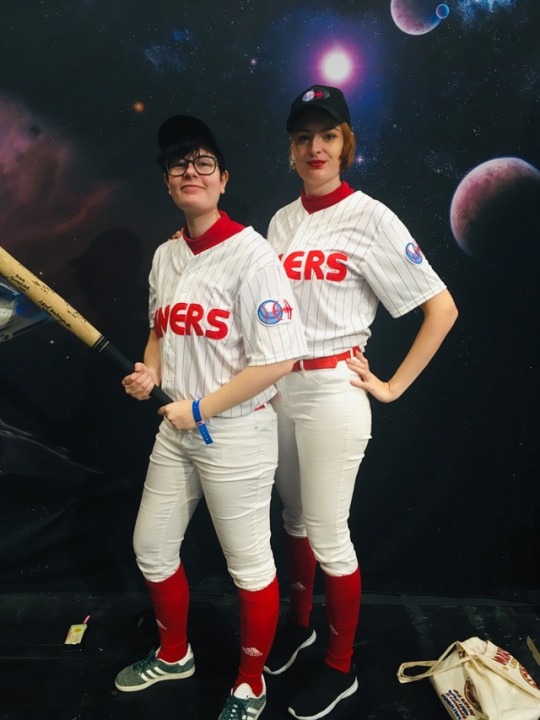
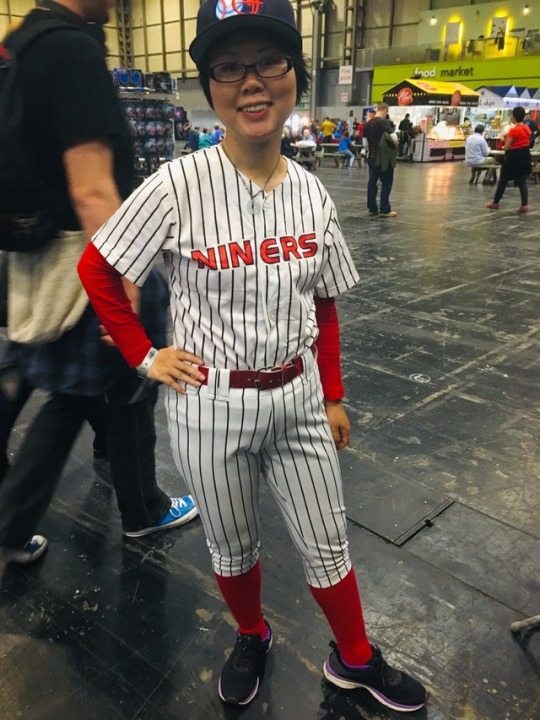
On my way back from Destination Star Trek. Great fun (although because I’m only a DS9 fan , not all the other Treks , there was a lot of people/ things I didn’t recognise!)
However - for ds9 I met Andrew Robinson, Armin Shimerman, Alexander Siddig, Nana Visitor and Rene Auberjonis - pretty much all for about 30 secs each, lol! But all of whom were lovely. I also met Ira Behr who signed something for me: he seemed very tired but still humoured my fan girl squeeing.
I asked no questions I’m afraid gang. And have no information or great answers to questions...other than most people’s view on what a lovely country Britain is to visit and regions of country they’ve hiked/ been on holiday to.
I wanted to ask Andrew Robinson what he thought old Garak would be like, twenty years later... so went back in afternoon, waited around until there was no one waiting at his signing desk. Engaged in polite conversation about how pleasant the weather has been for his visit... was about to go in for the ‘ so I’m writing this fic and You Have To Tell Me What Old Garak Is Like, It’s Driving Me Mad!’...
Only for bloody Alexander Siddig of all people to appear at his shoulder and tell him it was time for them to leave for a panel and they really had to go!
(Before anyone berates me - yes I should have got a photo, I know, I know. Literally Garak and Bashir stood together half a meter in front of me... I know. But honestly because I’m so used to seeing them together it didn’t even occur to me...I failed tumblr, I know...)
Went to the DS9 panel in the afternoon but mainly about documentary( which was yesterday so I hadn’t seen) and only lasted 30 mins or so.
However : I did start a ‘how many niners can I spot in cosplay competition’. Featured above are @lisjjabe and @sparkly-octopus plus a random Ds9 from China who said tumblr was banned in her country but post her anyway😀
Con was fun but in honesty, not enough DS9 content to fill a day... next time I think I might organise DS9 fan activities alongside it if anyone is up for it...
Still, first con down, woot!
Oh and I met a real life astronaut! Fred Haise of Apollo 13! How cool is that! He was old but really sharp and alert.
19 notes
·
View notes